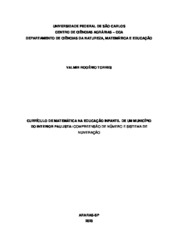| dc.contributor.author | Torres, Valmir Rogério | |
| dc.date.accessioned | 2023-05-12T15:45:38Z | eng |
| dc.date.available | 2023-05-12T15:45:38Z | eng |
| dc.date.issued | 2023-04-19 | eng |
| dc.identifier.citation | TORRES, Valmir Rogério. Currículo de matemática na Educação Infantil de um município do interior paulista: compreensão de número e sistema de numeração. 2023. Dissertação (Mestrado em Educação em Ciências e Matemática) – Universidade Federal de São Carlos, Araras, 2023. Disponível em: https://repositorio.ufscar.br/handle/ufscar/18008. | * |
| dc.identifier.uri | https://repositorio.ufscar.br/handle/ufscar/18008 | por |
| dc.description.abstract | This research presents an analysis of the Curriculum of the Municipal Education Network of Limeira, more specifically the part related to early childhood education. Its purpose is to verify how the contents related to mathematics, numbers and the numbering system are presented in this teaching stage. For this purpose, the conceptions of teaching-learning, student, teacher, curriculum itself and its characteristics were initially analyzed. The analyzes were carried out based on legal documents and Census data, aiming to demonstrate the evolution of early childhood education and its importance for the educational process and for the progress of society. Regarding the functionality of the teaching-learning process, progressive and liberating theories were used, which focus on the development of critical and participatory citizens, relating learning to their social context, based on the theories of Vygotsky, Rogoff and Paulo Freire. In the same way, a vision of curriculum was adopted that does not have the purpose of serving as social control, adopting Apple's propositions. With regard to mathematics, a historical view was adopted and the use of multiple intelligences with contributions from the theories of Smole, Boyer and Mezscach. In methodological terms, scientific research was used to support this work, based on document analysis and Bardin's content analysis technique, which allowed selecting points in the analyzed document that could be discussed to achieve the research objectives. Among the results presented, there was a lack of scientific research on the knowledge of newborn babies and the need to propose educational actions that consider the child's reality and social context. | eng |
| dc.description.sponsorship | Não recebi financiamento | por |
| dc.language.iso | por | por |
| dc.publisher | Universidade Federal de São Carlos | por |
| dc.rights | Attribution-NonCommercial-NoDerivs 3.0 Brazil | * |
| dc.rights.uri | http://creativecommons.org/licenses/by-nc-nd/3.0/br/ | * |
| dc.subject | Desenvolvimento e aprendizagem | por |
| dc.subject | Teoria curricular e linguagem | por |
| dc.subject | Matemática | por |
| dc.subject | Development and learning | eng |
| dc.subject | Curriculum theory and language | eng |
| dc.subject | Mathematics | eng |
| dc.title | Currículo de matemática na Educação Infantil de um município do interior paulista: compreensão de número e sistema de numeração | por |
| dc.title.alternative | Mathematics curriculum in early childhood education in a city in the interior of São Paulo: understanding numbers and the numbering system | eng |
| dc.type | Dissertação | por |
| dc.contributor.advisor1 | Calzolari Neto, Anselmo João | |
| dc.contributor.advisor1Lattes | http://lattes.cnpq.br/4906309581958797 | por |
| dc.description.resumo | Esta pesquisa apresenta uma análise do Currículo da Rede Municipal de Ensino de Limeira, mais especificamente a parte relativa à educação infantil. Tem por finalidade verificar como são apresentados os conteúdos relativos à matemática, aos números e ao sistema de numeração nesta etapa de ensino. Para tanto, inicialmente foram analisadas as concepções de ensino-aprendizagem, de estudante, de docente, do próprio currículo e de suas características. As análises foram realizadas a partir de documentos legais e dados do Censo, visando demonstrar a evolução da educação infantil e sua importância para o processo educacional e para o progresso da sociedade. Em relação à funcionalidade do processo de ensino-aprendizagem, foram utilizadas teorias progressistas e libertadoras, as quais têm por foco o desenvolvimento de cidadãos críticos e participativos, relacionando o aprendizado com seu contexto social, com base nas teorias de Vygotsky, Rogoff e Paulo Freire. Da mesma forma, adotou-se uma visão de currículo que não tenha como propósito servir de controle social, adotando às proposições de Apple. No tocante à matemática, adotou-se uma visão histórica e a utilização das inteligências múltiplas com contribuições das teorias de Smole, Boyer e Mezscach. Em termos metodológicos, foram utilizadas pesquisas científicas para subsidiar este trabalho, com base na análise documental e a técnica de análise de conteúdo de Bardin, que permitiu selecionar no documento analisado pontos que pudessem ser discutidos para atingir os objetivos da pesquisa. Entre os resultados apresentados, constatou-se a falta de pesquisas científicas sobre os conhecimentos dos bebês recém-nascidos e a necessidade de propor ações educativas que considerem a realidade e o contexto social da criança. | por |
| dc.publisher.initials | UFSCar | por |
| dc.publisher.program | Programa de Pós-Graduação em Educação em Ciências e Matemática - PPGEdCM-Ar | por |
| dc.subject.cnpq | CIENCIAS HUMANAS::EDUCACAO::CURRICULO | por |
| dc.publisher.address | Câmpus Araras | por |
| dc.contributor.authorlattes | http://lattes.cnpq.br/6155106609363315 | por |
| dc.contributor.authororcid | https://orcid.org/0000-0001-7426-5288 | por |
| dc.contributor.advisor1orcid | https://orcid.org/0000-0002-6703-9079 | por |

